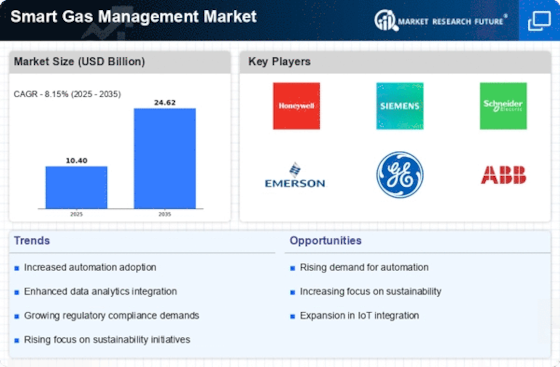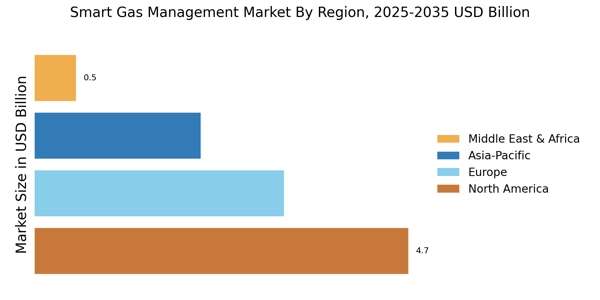Advancements in Data Analytics
Advancements in data analytics are transforming the Smart Gas Management Market. The ability to collect and analyze vast amounts of data allows companies to make informed decisions regarding gas distribution and consumption. Predictive analytics, in particular, enables organizations to forecast demand and optimize supply chains, thereby reducing costs and improving service delivery. The market is increasingly adopting analytics-driven solutions that provide insights into operational performance and customer behavior. This trend is underscored by the fact that organizations utilizing advanced analytics can achieve a 20% improvement in operational efficiency. As data analytics continues to evolve, its integration into smart gas management systems is likely to enhance decision-making processes and drive market growth.
Growing Focus on Sustainability
A growing focus on sustainability is emerging as a key driver in the Smart Gas Management Market. Stakeholders are increasingly aware of the environmental impact of gas consumption and are seeking solutions that minimize carbon footprints. Smart gas management systems facilitate this transition by enabling better monitoring and control of gas usage, thereby promoting sustainable practices. The market is witnessing a shift towards solutions that not only enhance efficiency but also align with sustainability goals. For instance, the adoption of renewable energy sources in conjunction with smart gas management can lead to a more sustainable energy ecosystem. This focus on sustainability is expected to propel market growth, as organizations strive to meet both regulatory requirements and consumer expectations for environmentally responsible practices.
Integration of Smart Technologies
The integration of smart technologies into the Smart Gas Management Market is a pivotal driver. The advent of advanced sensors and automation systems enhances operational efficiency and safety. These technologies facilitate real-time monitoring and data collection, which are essential for optimizing gas distribution and consumption. As per recent estimates, the market for smart gas management solutions is projected to grow at a compound annual growth rate of approximately 10% over the next five years. This growth is largely attributed to the increasing demand for efficient energy management systems and the need for reducing operational costs. Furthermore, the integration of smart technologies allows for predictive maintenance, which minimizes downtime and enhances service reliability, thereby driving the overall market forward.
Rising Demand for Energy Efficiency
The rising demand for energy efficiency is a significant driver in the Smart Gas Management Market. As energy costs continue to escalate, both consumers and businesses are increasingly seeking solutions that optimize gas usage and reduce waste. Smart gas management systems provide the necessary tools to analyze consumption patterns and identify inefficiencies. According to recent data, energy efficiency measures can lead to savings of up to 30% in gas consumption, which is particularly appealing in an era of rising energy prices. This trend is further supported by government initiatives aimed at promoting energy conservation and sustainability. Consequently, the demand for smart gas management solutions is expected to rise, as stakeholders recognize the financial and environmental benefits of adopting energy-efficient practices.
Regulatory Compliance and Safety Standards
Regulatory compliance and safety standards play a crucial role in shaping the Smart Gas Management Market. Governments and regulatory bodies are increasingly imposing stringent regulations to ensure safety and environmental protection in gas management practices. Compliance with these regulations often necessitates the adoption of advanced gas management systems that can monitor emissions and ensure safe operations. The market is witnessing a surge in demand for solutions that not only meet these regulatory requirements but also enhance operational safety. For instance, the implementation of smart gas management systems can lead to a reduction in gas leaks and accidents, thereby aligning with safety standards. This regulatory push is expected to drive market growth, as companies seek to avoid penalties and enhance their reputational standing by adopting compliant technologies.

















